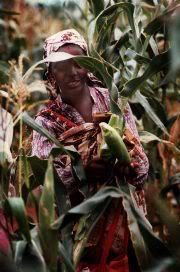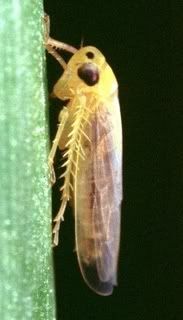First all-African genetically engineered maize is resistant to maize streak virus
 In a major breakthrough for African biotechnology, scientists developed a maize variety that is resistant to one of the continent's most destructive crop diseases. Maize streak viruses (MSV), geminiviruses that can destroy most of a maize crop, are endemic to sub-Saharan Africa and adjacent Indian Ocean islands where they are transmitted by leafhoppers in the genus Cicadulina. Maize can supply 50% of the caloric intake in sub-Saharan Africa, particularly in the Southern maize belt. But, in certain years, a farmer’s entire crop can be wiped out by the virus.
In a major breakthrough for African biotechnology, scientists developed a maize variety that is resistant to one of the continent's most destructive crop diseases. Maize streak viruses (MSV), geminiviruses that can destroy most of a maize crop, are endemic to sub-Saharan Africa and adjacent Indian Ocean islands where they are transmitted by leafhoppers in the genus Cicadulina. Maize can supply 50% of the caloric intake in sub-Saharan Africa, particularly in the Southern maize belt. But, in certain years, a farmer’s entire crop can be wiped out by the virus.Now, scientists at the University of Cape Town, South Africa, along with colleagues at the South African seed company, PANNAR Pty Ltd, have developed a resistant variety of maize that they hope will help alleviate food shortages as well as promote the reputation of genetically engineered (GE) foods in Africa. Disease caused by similar geminiviruses, Wheat dwarf virus (WDV) and various sugarcane streak viruses, also affect other crops, including barley, wheat, oats, sugarcane, and millet. The scientists think the technology developed for MSV could potentially be adapted to develop resistance in these other crops.
From an Afro-optimist's point of view, this is yet another signal that the 'African Green Revolution' is only now beginning to emerge. The continent has vast potential to increase both food and fuel production, and GM crops may play a role, although they remain controversial. In any case, Africa may have missed the agronomic revolution of the 20th century, it won't miss the 21st.
Dr. Dionne Shepherd of the University of Cape Town will be presenting the results of her breakthrough work and that of coauthors B. Owor, R. Edema, A. Varsani, D.P. Martin, J.A. Thomson and E.P. Rybicki, at the annual meeting of the American Society of Plant Biologists in Chicago (July 8) in a major symposium on Plant Biology in Sub-Saharan Africa organized by Debby Delmer of the University of California Davis.
Maize, which originated in Mexico, was carried to Africa in the 1500s and eventually displaced native food crops such as sorghum and millet. Maize streak virus, an endemic pathogen of native African grasses, was then carried to maize plants by viruliferous leafhoppers. African scientists have been working for more than a quarter of a century on developing resistant varieties of maize by selecting and crossing varieties with various degrees of resistance to the virus.
However, resistance requires multiple genes located on different chromosomes, so the process is not straightforward. The group at the University of Cape Town took the opposite approach. They mutated a viral gene that encodes a protein that the virus needs to replicate itself and inserted it into maize plants. When the virus infects one of these transgenic maize plants, the mutated protein, which is expressed at a high level, prevents the virus from replicating and killing the plant.
The transgenic maize variety has proven consistently resistant to MSV and the trait can be reliably passed on to the next generation and in crosses to other varieties. Field trials are scheduled to begin soon, not only to test the effectiveness of the technology in the field but also to ensure that the GE maize variety has no unintended effects on beneficial organisms that may feed on it. The resistant maize will also be tested to ensure that the viral protein is digestible and non-allergenic. The MSV-resistant maize is the first GE crop developed and tested solely by Africans:
 biofuels :: energy :: sustainability :: maize :: disease :: transgenic :: GMO :: biotechnology :: plant biology :: Africa ::
biofuels :: energy :: sustainability :: maize :: disease :: transgenic :: GMO :: biotechnology :: plant biology :: Africa :: The group of scientists also surveyed 389 Ugandan MSV isolates to assess the diversity and genetic characteristics of this destructive pathogen.
They found that the most prevalent strain of this virus is a product of recombination of different viral genotypes, thus identifying an important source of new pathogenic variants and illustrating the constantly changing evolutionary battle between plants and pathogens.
MSV was first sequenced in 1984 and found to contain a genome of only 2700 DNA bases in a circle of single-stranded DNA. When it infects susceptible plants, they produce deformed cobs and are often severely dwarfed. As the name of the virus suggests, the leaves are marked with parallel, yellow-white streaks.
 The timing of infection, the maize genotype, and prevailing climatic conditions can all influence the extent of damage wreaked by this viral pathogen. Young plants cannot survive the infection but older plants are better able to contain the infection, resulting in smaller losses of grain. However, drought can have a devastating effect on maize fields over a wide geographical area. Under warm and wet conditions, a long-bodied morph of the leafhopper C. mbila (picture) emerges, but this form only travels short distances of 10 meters or less, thus limiting its damage to crops. Under drought conditions, a stronger, short-bodied morph that can fly great distances spreads the disease over large areas, thus exacerbating the effects of the drought itself.
The timing of infection, the maize genotype, and prevailing climatic conditions can all influence the extent of damage wreaked by this viral pathogen. Young plants cannot survive the infection but older plants are better able to contain the infection, resulting in smaller losses of grain. However, drought can have a devastating effect on maize fields over a wide geographical area. Under warm and wet conditions, a long-bodied morph of the leafhopper C. mbila (picture) emerges, but this form only travels short distances of 10 meters or less, thus limiting its damage to crops. Under drought conditions, a stronger, short-bodied morph that can fly great distances spreads the disease over large areas, thus exacerbating the effects of the drought itself.Disease caused by similar geminiviruses, Wheat dwarf virus (WDV) and various sugarcane streak viruses, also affect other crops, including barley, wheat, oats, sugarcane, and millet.
Thus, the technology developed for MSV could potentially be adapted to develop resistance in these other crops. Virologist Edward Rybicki and microbiologist Jennifer Thomson are hopeful that this year’s field trials will demonstrate not only the effectiveness of this technology in producing resistance to a destructive pathogen but also the safety of GE foods. Part of the objective is to provide seed that will be sold at a minimal profit to subsistence farmers, thus removing the objection that GE technology is principally profit-driven.
References:
Eurekalert: First all-African produced genetically engineered maize is resistant to maize streak virus - July 8, 2007.
University of Cape Town, Department of Molecular and Cell Biology: Symptoms and Effects of MSV.
 --------------
--------------
 AthenaWeb, the EU's science media portal, is online with new functionalities and expanded video libraries. Check it out for video summaries of the latest European research activities in the fields of energy, the environment, renewables, biotech and much more.
AthenaWeb, the EU's science media portal, is online with new functionalities and expanded video libraries. Check it out for video summaries of the latest European research activities in the fields of energy, the environment, renewables, biotech and much more.








0 Comments:
Post a Comment
Links to this post:
Create a Link
<< Home